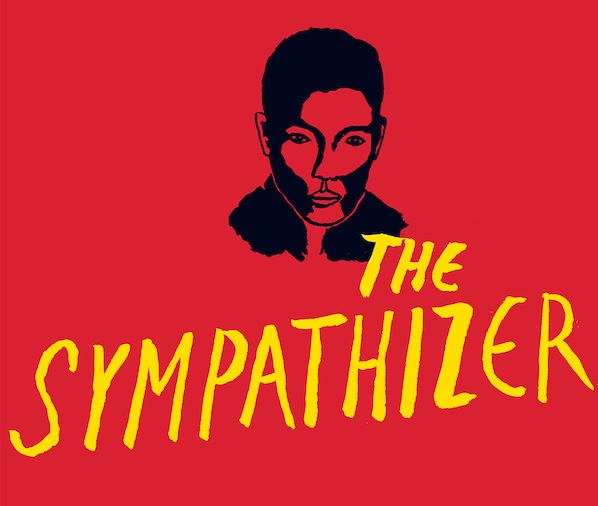Book Review: “The Sympathizer” — The Vietnam War, Split in Two
In this powerful novel about divisions, ideological and psychological, Vietnamese-American writer Viet Thanh Nguyen shakes up stereotypical notions of the War in Vietnam.
The Sympathizer by Viet Thanh Nguyen. 384 pages, $26

By Harvey Blume
This is the first novel by Vietnamese-American writer Viet Thanh Nguyen, and whatever few defects can be discerned in the plot are more than redeemed by cunning, often funny, sometimes chilling, prose, and by a fresh perspective on the War in Vietnam.
Whatever you think or have thought about that War, whether for or against, and no matter how passionately, is likely to be made more complicated by this book. That’s in no small part due to the fact that the Vietnam-born narrator, known throughout simply as the Captain, is both fiercely communist and fiercely anti-communist, as savagely pro-American as he is anti-American, as pro-Ho Chi Minh as he detests every particle of Ho Chi Minh’s dogma.
The Captain is a man of “two faces” as he proclaims in the very first line of the book, and “of two minds.” When undergoing re-education/torture by a communist commandant in a newly reunified Vietnam, it is horrifically appropriate that the commandant regularly confronts him with “a naked, pickled baby with one body but two heads” — a deformation resulting from a “chemical defoliant invented by an American Frankenstein.”
The Captain traces his own duplicities to being a bastard, born in Vietnam to a Vietnamese mother he never ceases to mourn for — yes her pho and more so, her affection — and lecherous French priest who abandoned her. Being a bastard has been trouble for him since kith and kin took to beating him up about it. The commandant, privy to his prisoner’s past, declaims: “Your destiny is being a bastard while your talent, as you say, is seeing from two sides. You would be better off if you only saw things from one side. The only cure for being a bastard is to take a side.”
What the commandant does not know is that the Captain has already chosen, has already, as much as he is able, devoted himself to one side, namely the communist cause. In Vietnam he was a spy in the service of a general in the doomed South Vietnamese army, secretly reporting back to a communist superior/commissar Man, one of his two childhood blood brothers. The other blood brother is Bon, who hates Marx and Mao as much as Man is inspired to spread news of their redeeming dialectic. Bon is actually not much bothered by thesis, antithesis etc.. His hatred of communism dates to his having witnessed his father, a village chief, being forced by communists to kneel in the village square before they inserted “a bullet behind his ear.”

Author Viet Thanh Nguyen — he writes cunning, often funny, sometimes chilling, prose.
Now let me now take back what I said before about the commandant’s ignorance of the Captain’s devotion to communism. In fact, he is fully apprised of it. This novel consists until near the end of the Captain’s worked and reworked confessions to the commandant. What bothers the commandant is not so much the substance of his narrative as its style. The Captain, no matter what extremes he is subject to, can’t, doesn’t know how, to give up nuanced expression. To that degree, he is irredeemable as a full-fledge communist cadre. The commandant declares: “your language betrays you. It is not clear, not succinct, not direct, not simple. It is the language of the elite.” The Captain, in short, cannot for the very life of him, forgo writing well.
He knows full well what he should be writing, “Long live the Party and the State. Follow Ho Chi Minh’s glorious example. Let’s build a beautiful and perfect society!” He can say such things under duress, but cannot bring himself to write them: “I could say that I was contaminated by the West, but I could not inscribe that on paper.”
That the main character is a man of “two faces” and “of two minds” puts him in a tradition of great novels, mostly nineteenth century, about stark and explosive doublings. These include Dostoevsky’s The Double, Zola’s The Human Beast, and Robert Louis Stevenson’s Strange Case of Dr. Jekyll and Mr. Hyde, though it’s not so easy to tell, in this novel about Vietnam, which of the Captain’s personae is Dr. Jekyll and which is Mr. Hyde.
Harvey Blume is an author — Ota Benga: The Pygmy At The Zoo — who has published essays, reviews, and interviews widely, in The New York Times, Boston Globe, Agni, The American Prospect, and The Forward, among other venues. His blog in progress, which will archive that material and be a platform for new, is here. He contributes regularly to The Arts Fuse and wants to help it continue to grow into a critical voice to be reckoned with.

I know, I often, oddly, post comments to my own pieces. Here’s one I’d like to post in regard to my review of The Sympathizer. (It has already appeared in somewhat different form on Facebook):
I’m sorry it took me so long to write about The Sympathizer, a painfully good novel about the War in Vietnam. In the interim, others have focused on how the Vietnamese-born author, Viet Thanh Nguyen, has gone full-tilt at Francis Ford Coppola.
He’s written, for example: “Apocalypse Now was a movie that was very important to me. I think I saw it when I was 10 or 11 years old, one of the early movies I saw on a VCR — [and it] totally traumatized me. My voice would shake even 10 years later describing a scene from the movie where the sailors massacre a sampan full of Vietnamese civilians.”
The novel gets even, as best fiction can with a Hollywood blockbuster. Coppola is called The Auteur in the novel, directing a masterwork — “The Hamlet,” no less — about “my countrymen serving merely as raw material for an epic about white men saving good yellow people from bad yellow people.”
As I’ve said, others have covered the Coppola angle. I preferred not to feast on it, since there is so much else to recommend about this book.